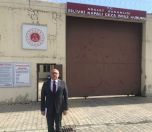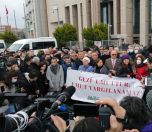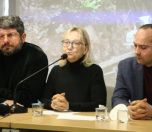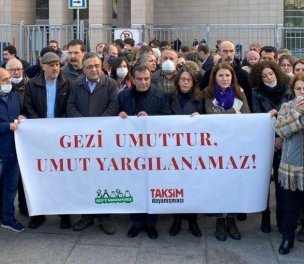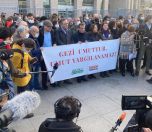* Drawing: Murat Başol
Click to read the article in Turkish / Kurdish
The İstanbul 13th High Criminal Court conducted the monthly review of Osman Kavala's arrest based on his case file today (April 15). By a majority of votes, the court has ruled that Kavala's arrest shall continue "on the grounds that there has been no change in his legal situation."
One of the judges of the court board has expressed a dissenting opinion, noting that Osman Kavala should be released on probation.
The next hearing of the Gezi trial, of which Kavala is the only arrested defendant, will be held on April 22, 2022.
The detention of Osman Kavala
In their statement titled "Summary of the 3.5 Years: Crime Not Found" dated May 17, 2021, Osman Kavala's lawyers summarized the judicial proceedings faces by Osman Kavala in the following words:
"The story of Osman Kavala's detention is a remarkable example of the politicization of the judiciary and its use for political purposes. It is an example of the attempts to create crimes according to the person who is sought to be punished. It clearly shows how conspiracy theories can be used instead of evidence, ignoring not only legal norms but also the rule of reason.
"Kavala was arrested on 1 November 2017 on the charges of 'attempting to overthrow the government or to prevent it from exercising its functions' (Article 312 of the TCC) and 'attempting to overthrow the constitutional order through force and violence' (Article 309 of the TCC).
"He was acquitted in his trial for attempting to overthrow the government by acting as the financier and organizer of the Gezi Protests. After the decision of acquittal, he was not released but ordered detention again on the second charge, for which a release order had already been issued.
"In the meantime, the European Court of Human Rights (ECtHR) ruled that there was not any evidence to raise reasonable suspicion for the charge of overthrowing the government and other charges related to the attempted coup of 15 July 2016; that the detention constituted the abuse of power for political reasons; and that Kavala should be released immediately. A third charge, the charge of espionage (Article 328 of the TCC), was brought in order to circumvent the judgment of the ECtHR and continue the detention.
"This charge was included in the second indictment issued against Kavala without explaining which classified information was the substance of the allegation of espionage and how and from whom it was obtained. The indictment also included incredible allegations that Kavala was in contact with the secret officers of the Gülenist organization, that he was involved in the attempted coup of 15 July, and that he even coordinated those who would take part in the new government to be established after the coup.
"In the indictment, it was alleged that Kavala had frequent contact with Henri Barkey, who was alleged to be a secret agent of the foreign powers behind the attempted coup, as a basis for the charges of espionage and supporting the attempted coup of July 15. The so-called evidence for this allegation was the fact that Kavala's mobile phone transmitted signals from places close to Barkey's location, even though his mobile phone was transmitting signals from his office, which was between the Divan and Hilton hotels. Furthermore, their mobile phones did not even transmit signals to the same cell tower. The explanation provided for the fact that there was no concrete evidence was that the relationship was maintained in a very secretive manner.
"During his imprisonment of more than 3.5 years when he was ordered detention on different dates in relation to the cases in which he was tried on highly serious charges such as overthrowing the government, being involved in the attempted coup, and espionage, Osman Kavala has never been interrogated by the prosecutor.
"Despite this severe lack of evidence, at different stages of the legal process the President made several remarks suggesting that Kavala was guilty. In one of these remarks, he criticized the decision of acquittal in the Gezi trial and described it as an operation to ensure the release of Kavala.
"In the hearing to be held in 30th Assize Court on 21 May, it is expected that the Gezi case concerning Kavala will be merged with the Gezi case concerning the Çarşı group, with both cases joined with the trial concerning the allegations of supporting the attempted coup of 15 July and espionage against Kavala. This is an attempt to establish a connection between different actions and people who do not know each other.
"This practice, which we have previously encountered in the Ergenekon and Sledgehammer trials, emerges as a convenient method for creating perception in political cases. It seems that the criminalization of the Gezi Events as a foreign plot through the judiciary will remain on the agenda of the politics and that the efforts to keep Kavala in prison will continue as a proof of this narrative."
A brief summary of Osman Kavala's arrest17 October 2017: Osman Kavala was detained. 1 November 2017: Kavala was ordered arrest on the charges of 'attempting to overthrow the government or to prevent it from exercising its functions' (Article 312 of the TCC) and 'attempting to overthrow the constitutional order through force and violence' (Article 309 of the TCC). 24 December 2018: The investigation files under Article 309 and 312 of the TCC were separated. 19 February 2019: The first indictment against Kavala was issued under Article 312 of the TCC 16 months after he was arrested. 11 October 2019: A release order was issued in favor of Kavala on the charge under Article 309 of the TCC. 10 December 2019: The ECtHR ruled that Kavala's detention constituted a violation of human rights and that he should be released immediately. 18 February 2020: A decision of acquittal was issued in the trial heard under Article 312 of the TCC. 19 February 2020: After the decision of acquittal, Kavala was not released but was arrested again on the charge under Article 309 of the TCC. 9 March 2020: Kavala was ordered arrest under Article 328 of the TCC. 20 March 2020: The second release order was issued in favor of Kavala under Article 309 of the TCC. However, his detention on the charge of espionage under Article 328 of the TCC continued. 3 September 2020: The Committee of Ministers of the Council of Europe, which oversees the execution of the judgments of the ECtHR, ruled that the judgment of the ECtHR should be executed and that Kavala should be released immediately. 29 September 2020: The Constitutional Court of the Republic of Turkey decided to examine the application of Kavala regarding his unlawful detention. However, it postponed the examination as the second indictment including the charges under Articles 309 and 328 (espionage) of the TCC was submitted to the court on the same day. 29 September 2020: In the second meeting in which this matter was discussed, the Committee of Ministers of the Council of Europe ruled that an interim decision should be drafted to be issued in the event that the judgment of the ECtHR is not executed. 3 December 2020: The Committee of Ministers of the Council of Europe issued an interim decision that Kavala should be released immediately and that the Constitutional Court should examine the file in accordance with the judgment of the ECtHR without further delay. 15 December 2020: The Constitutional Court decided to examine the application regarding the unlawful detention and ruled that the file should be referred to the General Assembly of the Constitutional Court. 18 December 2020: The 36th Assize Court ruled that the detention shall continue. The second hearing was scheduled on 5 February. 29 December 2020: The Constitutional Court ruled with 8 to 7 votes that the decision of Kavala did not constitute any violation of right. The reasoned judgment included the strongly dissenting opinions of the judges who voted that the detention constituted a violation of rights. 22 January 2021: The Appellate Court overturned the decision of acquittal in the Gezi trial. It ruled that the file concerning this trial shall be examined together with the files under Articles 309 and 328 of the TCC. 28 January 2021: After the decision of acquittal was overturned, the 30th Assize Court issued a preliminary proceedings report and scheduled the trial concerning the consolidated files on 21 May 2021. 5 February 2021: In the trial heard in the 36th Assize Court, the Court ruled that Kavala's trial shall be consolidated with the Gezi Trial, which will be heard again in the 30th Assize Court under Article 312 of the TCC, and that the detention of Kavala on the charges of espionage under Article 328 of the TCC shall continue. 30 April 2021: As a result of its examination of the detention, the 30th Assize Court ruled that the detention of Kavala shall continue. 12 May 2021: In its weekly meeting of 12 May 2021, the Committee of Ministers of the Council of Europe reviewed Kavala's file and expressed their great concern that Turkish authorities and courts did not take the necessary steps to end Kavala's the continued detention against the judgment of the ECtHR. The Committee urged the member states to bring up the continued detention and immediate release of Kavala during their meetings with Turkish authorities. It pointed out that the detention of Kavala would be reviewed again by the 30th Assize Court on 21 May 2021, and urged the authorities to take all the necessary steps to ensure the release of Kavala. 21 May 2021: At the hearing held by the İstanbul 30th High Criminal Court, the court board ruled that Osman Kavala's arrest on "espionage" charges should continue. The court board also demanded that the Gezi file about the çArşı group should be examined in consideration of a possible merging of the cases and be sent back to the court. 9 June 2021: The Committee of Ministers of the Council of Europe announced that it would bring infringement proceedings against Turkey in the event of Turkey's continued failure to implement the ECtHR ruling on Kavala. It noted that his imprisonment was against international law and Kavala should be released immediately. 28 July 2021: Temporarily appointed as the Presiding Judge of the 13th High Criminal Court during the judicial recess, the Presiding Judge of the İstanbul 30th High Criminal Court, as the Presiding Judge of the local court which had not given consent, gave consent to his own request for merging the cases. 2 August 2021: Even though the İstanbul 30th High Criminal Court was to hold a hearing on August 6, it held a hearing four days before, ruled by a majority of votes that the case should be merged with the ongoing case at the İstanbul 13th High Criminal Court and Osman Kavala's arrest should continue. 17 September 2021: The Committee of Ministers of the Council of Europe decided to wait before imposing sanctions on Turkey over its failure to implement the ECtHR rulings on Osman Kavala and Selahattin Demirtaş, the jailed former Co-Chair of the Peoples' Democratic Party (HDP). It reiterated its call for Kavala's release. 8 October 2021: Following the merging of the Gezi and çArşı cases, the first hearing was held. The İstanbul 13th High Criminal Court did not release Osman Kavala on the grounds of "strong criminal suspicion". One member of the court board expressed a dissenting opinion. None of the requests raised by the lawyers was accepted. In his defense at court, Osman Kavala said, "The continuation of my arrest on lame grounds is extrajudicial execution, it is an attempt to create a perception." 11 October 2021: The European Union Delegation to Turkey recalled that there was no ruling of conviction against Osman Kavala and said that the failure to release him despite the ECtHR ruling is extrajudicial. The Delegation demanded Kavala's immediate release. 18 October 2021: The Embassies of 10 countries (Germany, the United States of America, Denmark, Finland, France, the Netherlands, Sweden, Canada, Norway and New Zealand) called on Turkey to release Osman Kavala immediately. 19 October 2021: The Ministry of Foreign Affairs of Turkey summoned the ambassadors. President and ruling AKP Recep Tayyip Erdoğan and Minister of Interior Süleyman Soylu criminalized Osman Kavala even though he was not convicted and was acquitted before. 22 October 2021: Following the statements of Erdoğan, Kavala said that these remarks left "no possibility for a fair trial", adding, "I believe my participation in the hearings and presenting a defense would be meaningless." 23 October 2021: Erdoğan said that he instructed the Ministry of Foreign Affairs to declare the 10 ambassdors "personae non gratae". 25 October 2021: The ambassadors announced that they maintained compliance with Article 41 of Vienna Convention on Diplomatic Relations. The same day, Erdoğan welcomed these statements. The Court of Cassation and the Board of Judges and Prosecutors also made statements indicating that the judiciary is independent in Turkey. 26 October 2021: Nationalist Movement Party (MHP) Chair Devlet Bahçeli targeted the Constitutional Court through Osman Kavala, who had been behind bars for 4 years, and argued that the top court should be closed. He argued that the ECtHR rulings "became a leverage in the hands of the West. 27 October 2011: Speaking about the infringement proceedings that might be brought against Turkey over the failure to release Osman Kavala, Erdoğan said that "Turkey would go its own way". 2 November 2021: In his fourth year behind bars, Osman Kavala sent a message from prison: "After losing four years of my life and becoming an 'issue of the country', the only aspect I can find solace in is the possibility that the process I experienced could contribute to confronting the crucial problems in the judiciary of Turkey, thus, those who will be brought to justice in the future could receive a fairer treatment." Main opposition CHP Chair Kemal Kılıçdaroğlu also said, "There are Demirtaş and Kavala, who are unjustly held behind bars; this is unacceptable to my conscience." 26 November 2021: The second hearing of the merged çArşı and Gezi cases was held. At the hearing not attended by Osman Kavala, he was not released again. A member of the court board expressed a dissenting opinion to the ruling. 29 November 2021: Osman Kavala said the following about the charges against him: "The most striking characteristic of the espionage charge brought against me after the ECtHR decision to continue my arrest is that it is not based on the description of espionage in the laws." 2 December 2021: The Committee of Ministers of the Council of Europe decided to bring infringement proceedings against Turkey over its failure to implement the ECtHR ruling on Osman Kavala. In response to this, the Ministry of Foreign Affairs said, "Initiating certain mechanisms available under the European Convention of Human Rights, against certain countries based on political considerations rather than legal and equitable criteria undermines, first and foremost the reputation of the Council of Europe." 8 December 2021: Regarding the interim resolutions of the Committee of Ministers of the Council of Europe calling on Turkey to implement the ECtHR rulings on Selahattin Demirtaş and Osman Kavala and to release them immediately, President Erdoğan said, "We don't recognize the decisions taken by the European Union about Kavala, Demirtaş, this or that... This is so simple. We assume that 'they [decisions] do not exist'. In our eyes, these are null and void." 17 January 2022: The third hearing of the Gezi trial, which was merged with the çArşı case, was held. Osman Kavala did not attend the hearing as he previously announced that Erdoğan's remarks about him "left no possibility for a fair trial." The court ruled for the continuation of his detention. 2 February 2022: The Committee of Ministers of the Council of Europe officially launched infringement proceedings against Turkey because of its failure to release Osman Kavala despite a European Court of Human Rights (ECtHR) judgment. 21 February 2022: Handing down its interim ruling in the Gezi trial, the court board ruled that Osman Kavala's arrest should continue and the file of çArşı case, which had been previously merged with Gezi, should be separated from the file of Gezi. 4 March 2022: Announcing the opinion as to the accusations in the Gezi trial, the prosecutor requested aggravated life sentence for Osman Kavala and Mücella Yapıcı and up to 20 years in prison for other defendants Çiğdem Mater, Ali Hakan Altınay, Mine Özerden, Şerafettin Can Atalay, Tayfun Kahraman and Yiğit Ali Ekmekçi. 21 March 2022: While the final ruling was expected to be handed down, the court gave time to the defendants and their lawyers until April 22, 2022 as they objected, requesting time to make statements as to the accusations. The court rejected the requests for extending the investigation and ruled that Kavala's detention should continue. |
(HA/SD)




_-_Kopya.jpg)
